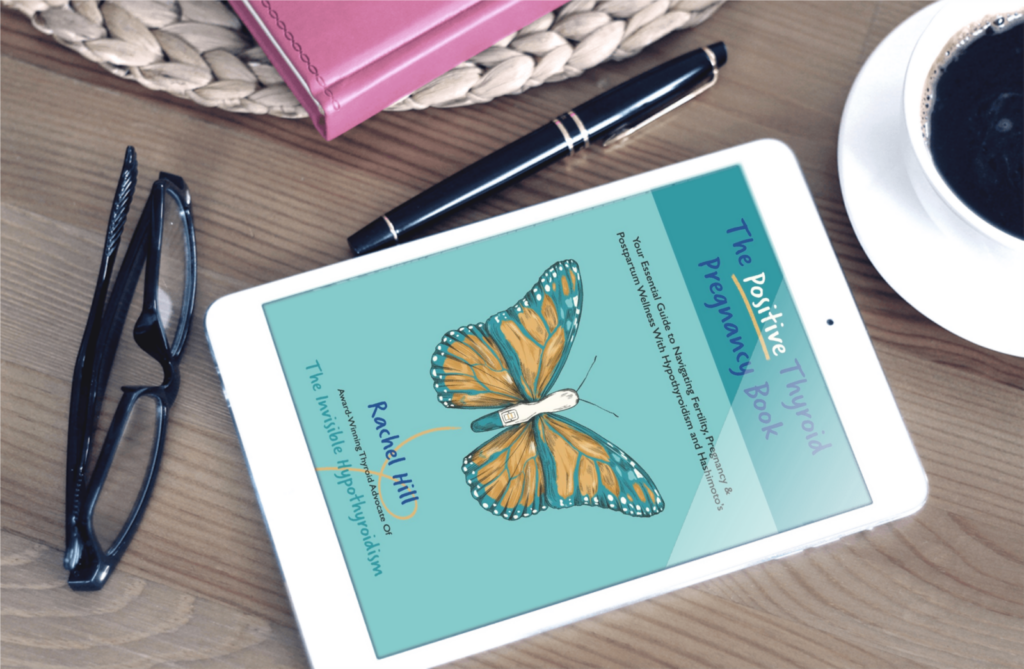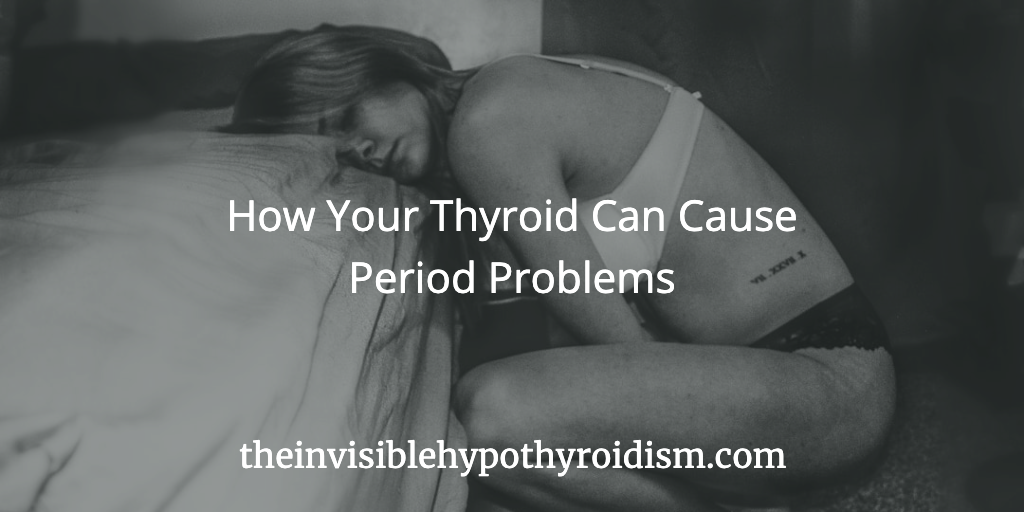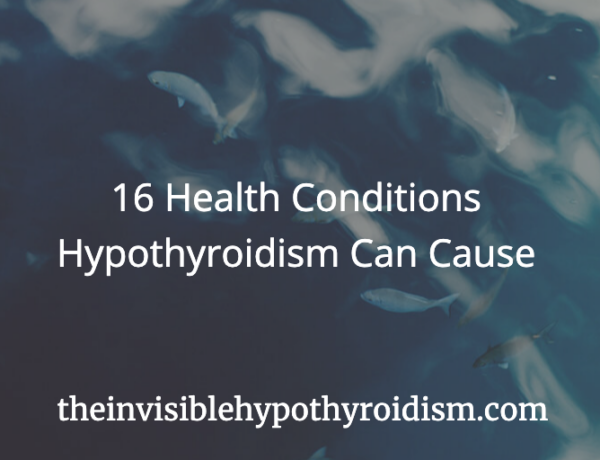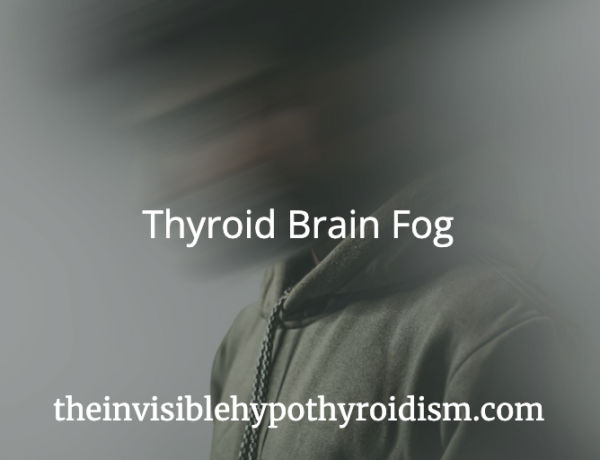Originally published on 29th August 2017 Last updated on 18th February 2025
Along with many of the other symptoms of hypothyroidism, menstrual issues is a common one. Thyroid hormone is needed for pretty much every function and cell in the body so when you’re hypothyroid, many processes — including your menstrual cycle — can be affected.
The direct link between thyroid disease and menstrual cycles is not well understood by many medical professionals just yet, but there are certain patterns we know to be true, going by many patients’ experiences and symptoms.
Hypothyroidism can lead to irregular menstrual cycles, non-ovulation and struggles to conceive. [1], [2], [3]
In a study of 171 pre-menopausal women with hypothyroidism:
- 77% had regular cycles
- 23% had irregular cycles
- 7% had heavy periods
Compared to a control group of women who did not have hypothyroidism:
- 92% had regular cycles
- 7% had irregular cycles and
- 1% had heavy periods
So as we can see, women with hypothyroidism are more likely to have period complaints, even when on thyroid hormone replacement medication, like Levothyroxine.
My Period Struggles
I have always experienced heavy periods, and they were so debilitating that I wasn’t able to easily leave the house for the first few days of my period. Women in my family accepted that this was our ‘normal’, so I did for years too, not questioning why I leaked often, even when using the heaviest sanitary products and soaking through them in half an hour. My bleeding was so heavy that I was constantly anaemic. They only time my ferritin (stored iron) levels were consistently good was when I was pregnant and not menstruating.
What helped me?
- Optimising my thyroid hormone levels by going from Levothyroxine to NDT
- Looking in to ‘oestrogen dominance’ (and coming off the contraceptive pill so I wasn’t messing further with my hormones)
- Finding out it was Adenomyosis
- Taking tranexamic acid
Adenomyosis is a condition where the lining of the uterus grows into the muscle wall of the uterus, which can cause very heavy menstrual bleeding, pain, and even discomfort during sex for some.
Whilst the first two items on that list helped, the fourth item made the biggest difference. After ruling out PCOS, endometriosis, fibroids and more, I was found to have Adenomyosis, and so we opted to use tranexamic acid to treat this which has been a life-changer. I now experience light, manageable periods.
Please ask your doctor about this if you’re having similar experiences and have all conditions ruled out.
Heavy Periods
Undiagnosed hypothyroidism or below optimal treatment for the condition is associated with a variety of menstrual issues.
One of these is heavy periods, also called ‘menorrhagia’.
Heavy periods or Menorrhagia is defined as excessively heavy or prolonged menstrual bleeding, such as soaking through a sanitary pad every hour for several hours or more, passing large blood clots (hypothyroidism and large blood clots during periods are common) or your period lasting longer than five days, which is seen as the average duration of a period.
Painful Periods
With heavy and long periods, you may also experience dysmenorrhea, particularly painful periods. Some discomfort is expected when your body is shedding itself from the inside, but pain that leads to you taking time off work or school isn’t something you just have to put up with.
This commonly includes backache, headache (migraines) and stomach cramps (period pains). If yours are excessive or have you curled over in pain, they may well be caused by a thyroid problem, or other conditions such as PCOS or Endometriosis. Please have these evaluated by a doctor.
Irregular Periods
Irregular or sporadic periods, e.g. going a month between having one and then two months before another and three weeks before another, can also be a symptom of hypothyroidism and so can ‘Amenorrhea’, when periods stop altogether.
Amenorrhea can also be a sign of hyperthyroidism, so it’s definitely worth having a full thyroid panel ran to get a good insight into what’s going on. If you have irregular or sporadic periods this can be really frustrating and even anxiety-inducing. If your doctor won’t run a full thyroid panel, you can find out how to do it yourself here.
As well as a full thyroid panel, I would suggest looking into your salivary cortisol levels and checking for adrenal dysfunction (note: it is more accurately referred to as hypothalamic-pituitary axis dysfunction).
Short Cycles
Hypothyroidism and adrenals issues can also cause periods to come knocking more often than normal, a condition known as ‘Polymenorrhea‘.
With this, you may find that your period comes more frequently than it should, every twenty-one days for example, instead of the average twenty-eight day cycle.
A sex hormone imbalance such as low progesterone and too much oestrogen, is sometimes theorised to be at fault, as a low progesterone level may mean that the luteal phase can’t be sustained for long enough, so is cut short, bringing on your period sooner and harming chances of falling pregnant. More on that below.
Delayed Periods
Something else to mention, any teenage girls who are yet to start their period and are approaching their late teens, should be tested for a potential thyroid problem, as it could be the reason for delayed menstruation.
Fertility
In terms of fertility, hypothyroidism can also be involved there.
Thyroid hormones directly affect the uterine lining, causing infertility or miscarriages to occur when they are abnormal. As well as complications during pregnancy, some women with low thyroid levels may even struggle to fall pregnant at all.
Hormones TSH (thyroid stimulating hormone) and TRH (thyrotropin-releasing hormone) are ramped up when thyroid hormones such as Free T3 and Free T4 fall too low; TRH to stimulate the pituitary gland to release TSH, which then instructs the thyroid gland to release more thyroid hormones T3 and T4.
Infertility can therefore occur when TRH, which is also responsible for stimulating the pituitary gland to release prolactin, causes the increased prolactin to interfere with the ovulation process, when thyroid hormones are low.
The increased prolactin levels (prolactin is also important for promoting lactation) can prevent the ovaries from releasing an egg each month, which makes it more difficult to conceive. Therefore, ensuring your thyroid levels, TSH, Free T3 and Free T4, are all optimal is crucial when trying to conceive.
Hypothyroidism may also cause a short luteal phase which can affect fertility. The luteal phase is the time between ovulation (the release of an egg) and the start of your period. In order to become successfully pregnant, your body needs to be in its luteal phase for around fourteen days, to allow a fertilised egg enough time to successfully implant and start to develop. If your luteal phase is too short, a successfully fertilised egg may not have the chance to implant and so becomes removed from the body during your period. Thus affecting the ability to fall pregnant.
- Read more about hypothyroidism and fertility here.
- Also find a book on pregnancy and fertility with hypothyroidism here.
- Read the 11 Things I Did to Optimise Conceiving With Hashimoto’s and Hypothyroidism
So, What Can You Do?
With any menstrual issues or abnormalities, a full thyroid panel testing Free T3, Free T4, TSH and thyroid antibodies should be run, and a 24 hour saliva test for cortisol (checking for adrenal dysfunction), as well as assessments for PCOS, Adenomyosis and endometriosis which can go hand in hand with thyroid issues. For a PCOS Blood Test, click here.
Tests looking for an imbalance of oestrogen to progesterone are debated on whether they are actually helpful. The concept of ‘oestrogen dominance‘ is still debated.
Test Options:
Full Thyroid Panel: UK lab here and a US lab here.
Sex Hormone Testing: This UK test checks almost all in one go (minus progesterone) and This US lab checks almost all of these in one go (minus prolactin).
We ideally test progesterone at its peak, around day 21 of your cycle (this may differ or be difficult to predict if you have an irregular cycle), and oestrogen Days 3-5. Testosterone can be tested at anytime during the month and checking FSH (the ovarian egg supply) can also be beneficial.
I also highly recommend testing ferritin levels too, since low ferritin levels and menstruation issues often go hand in hand and correlate to thyroid issues.
Do ensure your thyroid levels are optimal as an initial step. Many of the problems mentioned in this post can be solved with optimal thyroid levels.

See Also:
Get The Positive Thyroid Pregnancy Book: Your Essential Guide to Navigating Fertility, Pregnancy & Postpartum Wellness With Hypothyroidism and Hashimoto’s which covers fertility, pregnancy and postpartum health with thyroid issues.
You can click on the hyperlinks in the above post to learn more and see references to information given but more information can also be found at:
https://www.theinvisiblehypothyroidism.com/2017/11/14/oestrogen-dominance-and-hypothyroidism/
https://www.ncbi.nlm.nih.gov/pubmed/9238278
https://www.theinvisiblehypothyroidism.com/2017/04/25/fertility-with-hypothyroidism/
References
1. https://www.ncbi.nlm.nih.gov/pubmed/21641659
2. https://www.ncbi.nlm.nih.gov/pubmed/20573783
3. https://www.ncbi.nlm.nih.gov/pubmed/22115162






